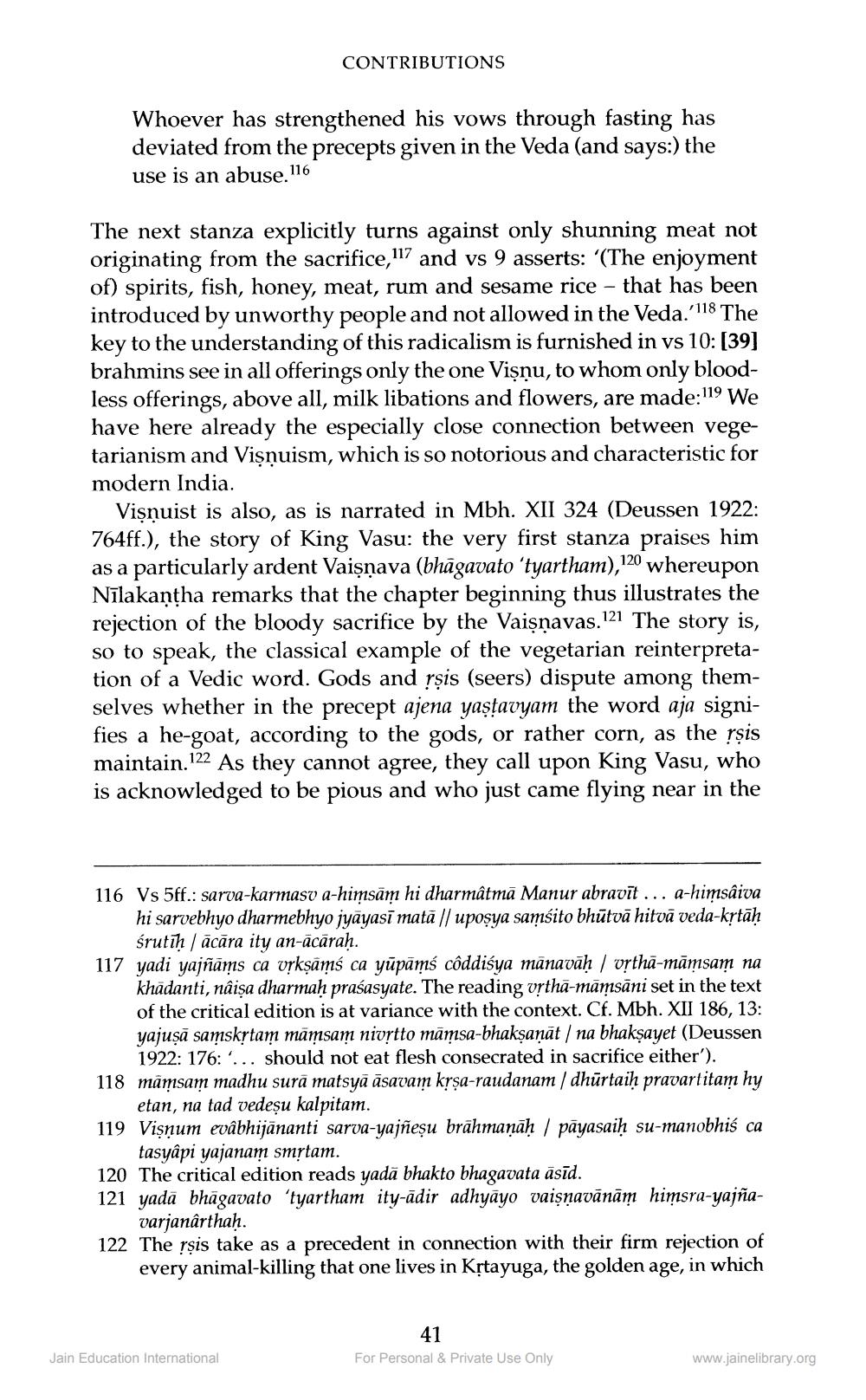________________
CONTRIBUTIONS
Whoever has strengthened his vows through fasting has deviated from the precepts given in the Veda (and says:) the use is an abuse. 116
The next stanza explicitly turns against only shunning meat not originating from the sacrifice, 117 and vs 9 asserts: '(The enjoyment of) spirits, fish, honey, meat, rum and sesame rice - that has been introduced by unworthy people and not allowed in the Veda.'118 The key to the understanding of this radicalism is furnished in vs 10: [39] brahmins see in all offerings only the one Vişnu, to whom only bloodless offerings, above all, milk libations and flowers, are made:119 We have here already the especially close connection between vegetarianism and Vişnuism, which is so notorious and characteristic for modern India.
Vişnuist is also, as is narrated in Mbh. XII 324 (Deussen 1922: 764ff.), the story of King Vasu: the very first stanza praises him as a particularly ardent Vaisnava (bhāgavato 'tyartham),120 whereupon Nīlakantha remarks that the chapter beginning thus illustrates the rejection of the bloody sacrifice by the Vaişnavas. 121 The story is, so to speak, the classical example of the vegetarian reinterpretation of a Vedic word. Gods and rșis (seers) dispute among themselves whether in the precept ajena yaşțavyam the word aja signifies a he-goat, according to the gods, or rather corn, as the rşis maintain. 122 As they cannot agree, they call upon King Vasu, who is acknowledged to be pious and who just came flying near in the
116 Vs 5ff.: sarva-karmasv a-himsām hi dharmâtma Manur abravit ... a-himsaiva
hi sarvebhyo dharmebhyo jyāyasī matā // upoşya sambito bhūtvā hitvā veda-kytāḥ
śrutīḥ / ācāra ity an-ācāraḥ. 117 yadi yajñāms ca vrkşāms ca yūpāmś côddiśya mānavāḥ / vịthā-māmsam na
khädanti, nâisa dharmah praśasyate. The reading vrtha-māmsāni set in the text of the critical edition is at variance with the context. Cf. Mbh. XII 186, 13: yajuşā samskrtam māmsam nivetto māmsa-bhakşaņāt / na bhakşayet (Deussen
1922: 176: ... should not eat flesh consecrated in sacrifice either'). 118 måmsam madhu surā matsyā āsavam krsa-raudanam / dhūrtaih pravartitam hy
etan, na tad vedesu kalpitam. 119 Vişnum evâbhijānanti sarva-yajñesu brāhmaṇāh / pāyasaih su-manobhis ca
tasyâpi yajanam smrtam. 120 The critical edition reads yadā bhakto bhagavata āsīd. 121 yada bhagavato 'tyartham ity-ādir adhyāyo vaisnavānām himsra-yajña
varjanârthaḥ. 122 The rşis take as a precedent in connection with their firm rejection of
every animal-killing that one lives in Kịtayuga, the golden age, in which
41 For Personal & Private Use Only
Jain Education International
www.jainelibrary.org




